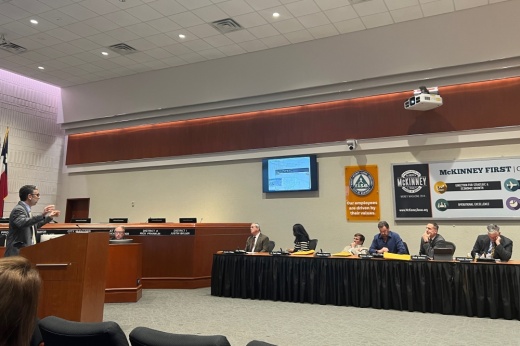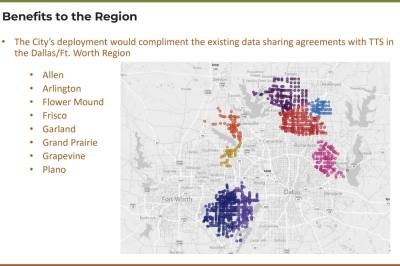The Oregon-based company approached the city to deploy its traffic signal information application, Personal Signal Assistant, in McKinney, according to Director of Engineering Gary Graham.
The program shares information with drivers about the traffic signals of participating cities, such as how long a driver can expect to wait at a traffic signal. The application can also tell drivers what speed to drive to hit more green lights and avoid additional stops as they are driving, Graham said.
The application is available on mobile devices as well as integrated in the dashboard systems of some newer models from automotive manufacturers Volkswagen and Mercedes-Benz, according to the presentation. For drivers who do not have dashboard integration, the program is available as an application with monthly subscription options ranging from $2-$5 each month, Graham said.
The no-cost partnership with the city would establish a trade of information to enable the company to add McKinney to its coverage area. The city would provide Traffic Technology Services with data from the city’s traffic signals, including signal timings, to be integrated into the application. In return, the company would provide signal performance reports back to the city that can be used to identify signals and intersections that need improvements, Graham said.
“We’re already collecting this data, and it’s publicly owned data. ... And we’re trying to make it available to somebody who can do something better with it than we can because that’s not a core function of what we do,” City Manager Paul Grimes said of the partnership.
The program is already in use in eight other North Texas cities, including Frisco, Plano and Allen. A contract to establish the partnership is expected to be presented to the council at a future meeting. The city is considering a fleet contract to have the program installed in city-owned vehicles, Graham said.
Graham also presented an update to council members on the city’s efforts to improve traffic signal equipment. City staff is working to modernize equipment on McKinney’s 104 traffic signals, he said.
The addition of a new central system, along with upgraded traffic signal controllers and vehicle detection systems, is expected to improve data collection and repair response times, Graham said. City staff is also working to expand the fiber network used to relay information to and from traffic signals, providing a more stable connection, Graham said.
“The reason we’re making all these investment[s] is we want that real-time performance so we can do a better job of operating the signal system,” Graham said. “We are trying to get those system alerts so we can respond and know of issues before we have to get notified by the residents.”






